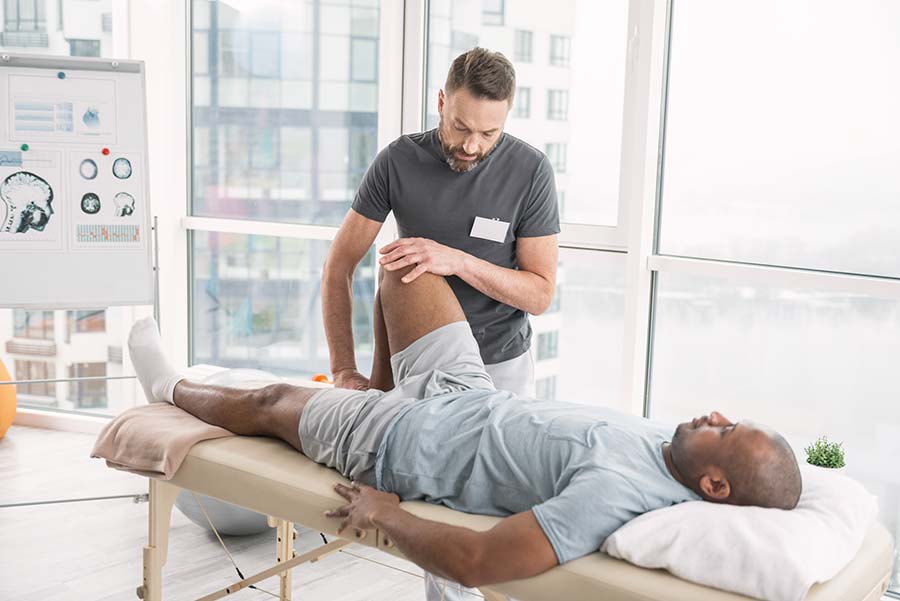Medical Treatment and Vocational Rehabilitation
Workplace injuries can be overwhelming, both physically and emotionally. At the forefront of the recovery journey is the right to proper medical treatment.
Medical treatment under the guise of worker’s compensation refers to the necessary medical care you receive following a work-related injury or illness.
Since 1995, attorney Steve Crane has successfully represented those who have suffered an injury and in need of legal assistance and representation.
As an experienced lawyer, Steve can gauge when it makes sense to go to court. He knows that a letter or phone call — with proper wording and timing — can be more effective or cost-efficient than suing for damages or injunctive relief.
For those cases that must be presented to a judge or jury, he is eminently qualified to assert your interests.
If you have sustained a workplace injury, call Steve free. He and his team can assess the facts of your case and help you determine the best course of action to move forward.
To schedule a discrete and confidential consultation about your matter, call Steve free at (888) 855-4400.
Did you know that you are entitled to medical treatment benefits if you are injured on the job?
In Michigan, employers must carry workers’ compensation insurance, which provides wage replacement, medical, and rehabilitation benefits to employees injured or falling ill because of their work, regardless of fault. In turn, the employee gives up the right to file a lawsuit against the employer and is limited to certain benefits. If you’ve been injured in Michigan, you should know your rights and responsibilities when filing a workers’ compensation claim.
Employers can opt to obtain approval from the state agency to be self-insured or participate in a group self-insurers’ organization.
Employers with three or more employees at any given time or those compensating one employee for 35 hours of work must have workers’ compensation insurance. Special provisions may be granted for significant construction projects to enable single coverage for all employees at a designated site. Injuries must occur during the course of employment at a worksite to be eligible for benefits. Employees are not entitled to benefits if their injuries result from intentional and willful misconduct. Additionally, injuries sustained at company-sponsored picnics, office parties, or events primarily for social or recreational purposes are typically not covered.
Employees commuting to and from work are generally not covered. However, coverage applies if travel is an integral part of the job or if the employee is on a special mission.

What benefits am I entitled to?
Michigan’s laws outline benefits for injured workers across four key categories:
- Wage Loss Benefits:
These commence after an injured worker has missed at least seven days of work due to their injury. Compensation begins on the eighth day, and if the injury persists beyond two weeks, the worker receives wage loss compensation for the initial week of disability. Weekly benefits are calculated based on the worker’s average wage for the highest 32 weeks of the previous 52 weeks, amounting to 80% of the after-tax value. The maximum wage-loss benefits cannot exceed 90% of the average weekly wage from the prior year. - Specific Loss Benefits:
If a worker loses specific body parts such as a hand, foot, or functional use of an eye or finger, they are entitled to specific loss benefits, equal to 80% of their after-tax average weekly wage, paid for a set number of weeks depending on the body part lost. - Total and Permanent Disability Benefits:
Workers meeting the criteria for total and permanent disability receive benefits for 800 weeks, regardless of their work status during that period. - Medical Benefits:
Injured workers must initially seek treatment from approved medical providers for the first 28 days.
Following this period, they have the choice of selecting their own doctor. All reasonable and necessary medical care, including medical, surgical, hospital, dental, and chiropractic care, must be covered by the employer or insurer.
Moreover, two paths exist for resolving claims without a trial: either through a lump-sum payment known as “redemption of liabilities” from the insurance carrier, or via a mutual agreement termed “voluntary payment.”
If a case goes to a magistrate, they may opt for a closed award (indicating the injury occurred, benefits were paid, and the worker is not back at work), an open award (providing comprehensive benefits to the injured worker), or the denial of benefits.
Rehabilitation benefits are provided to assist injured workers in returning to work, which may involve job alterations or retraining programs. Additionally, death benefits are available to dependents, covering funeral expenses and last illness costs, with payments based on a percentage of the deceased worker’s pre-injury wages.
If a worker collecting benefits passes away, the case concludes if the death is unrelated to the work injury; otherwise, survivor benefits are paid directly. Estate claims may involve any past due benefits awarded posthumously if the worker dies from unrelated causes before the award.

How do I obtain medical treatment if injured on the job and ensure I received proper care?
- If injured, seek medical care immediately. For emergencies, head to the nearest emergency room.
- Notify your employer about your injury and the medical care you’re receiving.
- Keep all medical reports, prescription notes, and any other relevant health information.
- Follow prescribed treatments and medications is essential for both your recovery and your claim’s success.
- File a worker’s compensation claim to ensure coverage of your medical expenses. Seek assistance if you’re unsure about the process.

What treatment am I entitled to?
In the event of a workplace injury, you have the right to receive medical treatment without any cost to you. Under the Workers’ Disability Compensation Act, the public law enacted by the Michigan Legislature, you are entitled to all reasonable and necessary medical treatment for injuries arising out of and during employment. Under the law, claims administrators are obligated to authorize and cover the expenses for medical care that are reasonably necessary to cure or alleviate the effects of the injury. This entails medical care aligned with scientifically established treatment guidelines. It is considered unlawful for a physician or medical facility to bill an employee if they know the injury has a potential connection to work.

What are my employer’s responsibilities to me?
Your employer must notify their insurance carrier when an employee is injured on the job site. If the recovery period for the injury will last more than seven days, the employer also must file Form WC-100 with the state’s Workers’ Disability Compensation Agency.
Form WC-100 asks for basic information (employee’s name, address, social security number, etc.) and the employer’s general business information. The form asks questions about where and how the accident occurred and describes the injury, so it is best to conduct a cursory investigation before filling out the form.
If, for any reason, your employer chooses not to file a worker’s compensation claim form, you may do so yourself. Form WC-117 and other forms pertinent to your claim are available on the Michigan Labor and Economic Opportunity website.

What if my medical treatment is denied?
If your workers’ compensation claim faces dispute or denial, you have the option to appeal by submitting paperwork to the Workers’ Compensation Agency.
A magistrate will be appointed to review your case, considering the provided medical documentation, and render a decision. It’s advisable to engage legal representation to guide you through the appeal process.
To substantiate your claim, it’s imperative to demonstrate disability resulting from the work-related injury, indicating a decrease in your maximum wage-earning capacity in roles suitable to your qualifications and training. It’s essential to understand that mere injury doesn’t automatically guarantee entitlement to workers’ comp benefits.
Appeals must adhere to specified time limits, and substantiating medical documentation is crucial to supporting your case.
Unlike other legal proceedings, workers’ compensation appeals lack a formal discovery process. Instead, all parties exchange relevant information, encompassing wage and medical records.
Throughout this phase, you may undergo examinations by doctors and vocational rehabilitation experts hired by the insurance company. It’s vital to recognize that these professionals are retained by the insurance company to minimize your claim, rather than to assist you.
Upon conclusion of the discovery phase, a hearing is convened before a magistrate, who ultimately decides on the claim’s outcome.
QUICK LINKS
Did you know that you are entitled to medical treatment benefits if you are injured on the job?
What benefits am I entitled to?
How do I obtain medical treatment if injured on the job and ensure I received proper care?
What treatment am I entitled to?
What are my employer’s responsibilities to me?
PRACTICE AREAS
